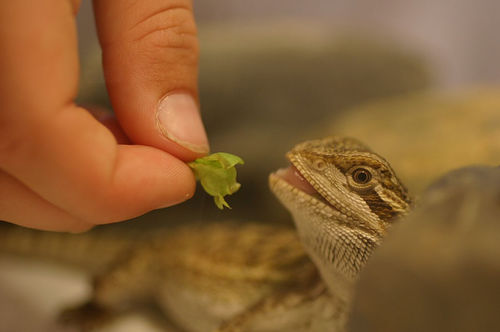The Ultimate Guide to Bearded Dragon Care: Everything a Beginner Needs to Know
Introduction
Owning a pet can be a fulfilling experience, and for those who enjoy the company of reptiles, a bearded dragon can be an excellent companion. However, as with any pet, they require proper care to ensure they live a happy, healthy life. In this guide, we will provide a comprehensive overview of bearded dragon care, suitable for beginners.
What is a Bearded Dragon?
Bearded dragons are a type of lizard that are popular as pets due to their affectionate and easy-going personalities. They are native to Australia and are named for the spiky beard-like protrusion under their chin, which they puff up when they feel threatened.
Housing
Bearded dragons require a spacious and safe enclosure to live in. A 40-gallon tank is suitable for one adult bearded dragon, with an additional 20-gallons for each additional dragon. The enclosure should be made of glass or plastic, as wood can be difficult to clean and can harbor bacteria.

The enclosure must be equipped with proper lighting and heating. A basking light that emits UVB rays, essential for vitamin D synthesis, should be provided, along with a heat lamp to maintain the appropriate temperature range of 80-100°F during the day and 70-75°F at night. The enclosure should also have a moisture gradient, with a humid hide for shedding and an area for drinking water.
Diet
Bearded dragons are omnivorous, which means they eat both plant and animal matter. Their diet must be balanced to ensure good health. A staple diet of dark, leafy greens such as collard greens or mustard greens should be provided daily, along with insect prey such as crickets, roaches, or mealworms.

Fruit should be given in moderation, as it is high in sugar. Commercial food can be used as an occasional treat, but should not make up the bulk of their diet. Always consult a veterinarian or reptile specialist for advice on proper nutrition.
Hygiene
Good hygiene is crucial for the health of your bearded dragon. The enclosure should be spot cleaned daily and thoroughly cleaned and disinfected at least once a month. Be sure to remove any uneaten food items and feces promptly, as they can attract pests and bacteria.

Bearded dragons should also be given regular baths to promote healthy shedding and prevent infections. Use warm water and a non-toxic reptile shampoo or soap, and ensure that they are completely dried off before returning them to their enclosure.
Behavior
Bearded dragons are generally docile and friendly, and can often be trained to recognize and interact with their owners. However, as with any animal, they can become stressed or aggressive if not handled properly. Always handle your bearded dragon with care and respect, and do not force them to interact if they do not feel comfortable.
Health
Bearded dragons are prone to a variety of health issues, including metabolic bone disease, infections, and parasitic infestations. Regular check-ups with a veterinarian or reptile specialist are essential for early detection and treatment of these conditions.
Watch for signs of illness, such as lethargy, loss of appetite, or changes in behavior, and seek veterinary care promptly if you suspect something is wrong. Always maintain good hygiene and proper nutrition to prevent illness from occurring in the first place.
Conclusion
Owning a bearded dragon can be a rewarding experience, but it requires commitment and responsibility to provide proper care. By following the guidelines outlined in this guide, you can ensure that your bearded dragon lives a happy and healthy life. Remember to always consult with a veterinarian or reptile specialist if you have any questions or concerns, and enjoy your time with your new lizard friend!
